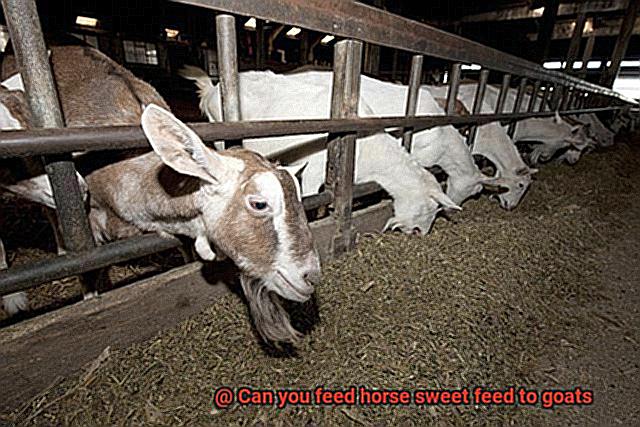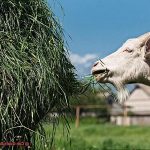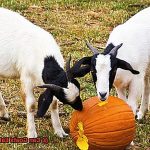Are you a goat owner? Do you want to know if horse sweet feed is a safe and effective feed option for your goats? Well, the answer isn’t as simple as yes or no. In this blog post, we’ll explore the nutritional differences between horses and goats and determine whether horse sweet feed can provide the right balance of nutrients for your curious creatures.
Goats have a reputation for being adventurous eaters. However, feeding them with the wrong type of food can result in severe health issues such as bloating and digestive problems. Therefore, it’s essential to ensure that they’re consuming a well-balanced diet.
We’ll delve deeper into this common question by discussing the potential risks of feeding horse sweet feed to goats. Additionally, we’ll provide guidelines on how to safely introduce this popular horse feed option into your goat’s diet.
So sit tight and get ready to learn more about this topic. We’re here to help you make informed decisions about what’s best for your goats’ health and wellbeing. Let’s explore whether horse sweet feed is a suitable option for your curious caprines.
What is Sweet Feed?
Contents
Sweet feed is a popular type of horse feed that consists of a mix of grains like corn, oats, and barley, and sweeteners like molasses. The sweetness of the feed is intended to make it more appealing to horses, encouraging them to eat more.
But did you know that sweet feed might not be the best choice for goats? Unlike horses, goats have different dietary needs and require a diet that is high in roughage and fiber. Sweet feed may be too high in carbohydrates and low in fiber for goats, causing digestive issues such as bloating or diarrhea.
Moreover, certain types of sweet feed might contain ingredients that are toxic to goats, such as copper. While copper is an essential mineral for many animals, excess levels of copper can accumulate in a goat’s liver and cause severe health problems.
That’s why it’s important for goat owners to choose a feed that is specifically formulated for goats. This will ensure that their nutritional needs are met and they remain healthy and content. Even if horse feed must be used as a temporary measure, it should be introduced gradually and in small amounts to avoid any digestive upset.
What Nutrients Does it Contain?
Sweet feed is a popular type of horse feed that provides horses with energy and nutrients. It contains grains, molasses, and various other ingredients. However, when it comes to feeding sweet feed to goats, there are some things to consider.
Sweet feed primarily contains carbohydrates which give the animal energy. It also contains protein, fiber, and fat. While these nutrients may be beneficial for horses, goats require a different diet that is high in fiber and low in carbohydrates. Consuming too many carbohydrates can cause digestive issues such as bloating and diarrhea.
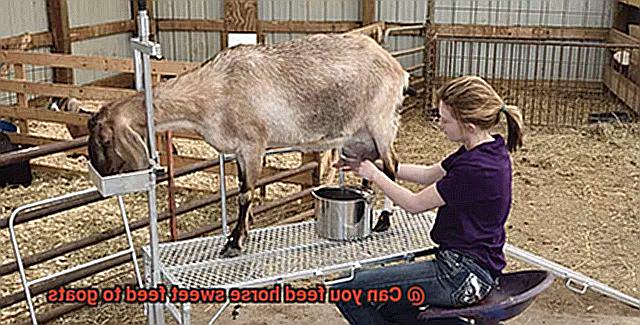
Additionally, goats have a different digestive system than horses, and their bodies may not be able to process certain ingredients found in sweet feed. This can lead to further digestive problems and even health issues if they do not receive the proper balance of nutrients.
Therefore, as an expert in goat nutrition, I strongly recommend using goat-specific feeds to ensure that they receive the proper balance of nutrients for their unique dietary needs. Although some goat owners may choose to supplement their goats’ diets with small amounts of sweet feed, it is not recommended as a primary source of nutrition.
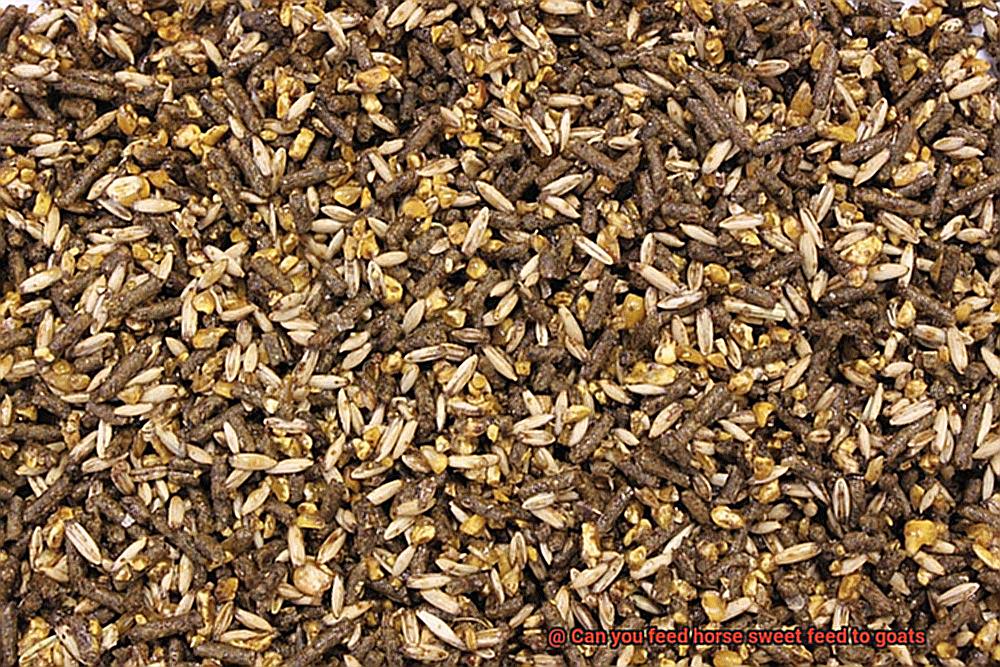
Is Sweet Feed Safe for Goats?
The answer is simple: no. Sweet feed, a popular horse feed made from grains, molasses, and other ingredients, can cause health problems in goats due to their unique nutritional requirements.
Goats require a diet that is high in fiber and low in carbohydrates, which is where sweet feed falls short. Feeding them sweet feed can lead to bloating, digestive upset, and even laminitis – a painful condition affecting their hooves.
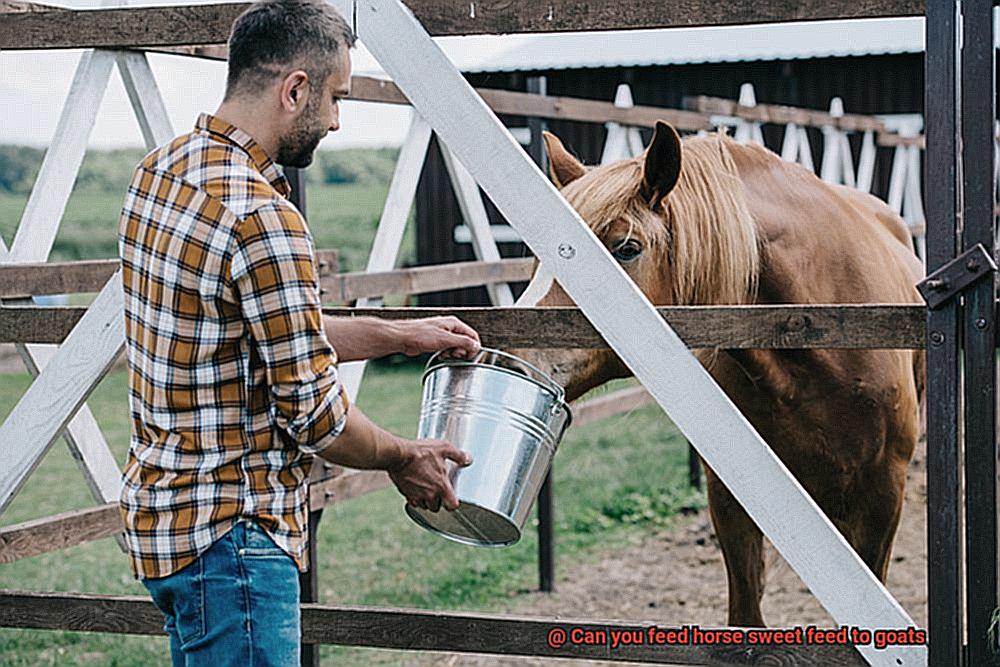
To keep our goats healthy and thriving, it’s important to provide them with a balanced diet rich in hay, browse, and a goat-specific pellet feed. These foods will provide the necessary fiber and nutrients to support their digestion and overall well-being.
As responsible goat owners, we want to prioritize our animals’ health and happiness. That means understanding their unique nutritional needs and avoiding potential health risks. While sweet feed may be suitable for horses, it is not safe for our beloved goats.
Potential Health Issues Associated with Sweet Feed and Goats
While this type of feed is a common choice for horses, there are potential health issues that can arise when feeding it to goats. As an expert on the matter, I am here to provide you with essential information to keep your goats healthy and happy.
One of the main concerns with sweet feed is its high sugar content. Goats are not designed to handle large amounts of sugar, and overconsumption can lead to a variety of health problems, including gastrointestinal upset, diarrhea, and even laminitis. Laminitis is a painful condition that affects the hooves and can cause lameness or even death in severe cases.
Sweet feed may also contain ingredients that are not suitable for goats. Molasses, a common ingredient in sweet feed, can disrupt the microbial balance in the goat’s gut and lead to digestive issues.
Furthermore, sweet feed is particularly susceptible to mycotoxin contamination. These toxic substances produced by fungi can grow on grains and other feed ingredients and cause liver damage, immune suppression, and even death in goats.
To avoid these potential health issues, it is best to prioritize your goat’s dietary needs by providing them with a balanced diet of hay, browse, and goat-specific pellet feed. Always consult with a veterinarian or animal nutritionist before making any changes to your goat’s diet.
Alternatives to Sweet Feed for Goats
Feeding your goats sweet feed might seem like the easiest option, but it’s essential to consider the potential health risks associated with it. Fortunately, there are plenty of alternatives to sweet feed that can provide your goats with all the necessary nutrients they need to thrive.
Firstly, hay and forage should always make up the bulk of your goat’s diet. Good quality hay and pasture can provide your goat with the necessary fiber, protein, and minerals they need to maintain good health. It is imperative to choose hay that is free from mold and dust and avoid hay that has been treated with chemicals.
If you prefer feeding pellets over hay, non-sweet feed options are also available in the market. These pellets are specially formulated for goats and contain all the necessary nutrients they need without any excess sugar content. Additionally, providing mineral supplements can help ensure that your goats are getting all the necessary minerals they require for optimal health.
Besides this, don’t forget about fresh fruits and vegetables. Goats love them and incorporating these treats into their diet can provide additional nutrients while also adding some variety to their meal routine.
ajCMKyLEV5w” >
Conclusion
In summary, feeding horse sweet feed to goats is not a wise choice. Goats have different dietary requirements than horses, necessitating a high-fiber and low-carbohydrate diet. Sweet feed contains high levels of sugar, which can cause digestive issues and even metabolic disorders in goats. Furthermore, certain components found in sweet feed may be toxic to goats.
It is critical for goat owners to select a feed that has been specifically tailored to meet their unique dietary needs. Goat-specific feeds are designed with the correct balance of nutrients and minerals required by goats to maintain healthy digestion and prevent health problems such as bloat or diarrhea.
Fortunately, there are numerous alternatives to sweet feed that can provide your goats with all the necessary nutrients they need to thrive. These include good quality hay and pasture, non-sweet feed pellets, mineral supplements, and fresh fruits and vegetables.
It is our responsibility to prioritize our animals’ health and happiness by understanding their unique nutritional requirements and avoiding potential health risks. Always consult with a veterinarian or animal nutritionist before making any changes to your goat’s diet.

